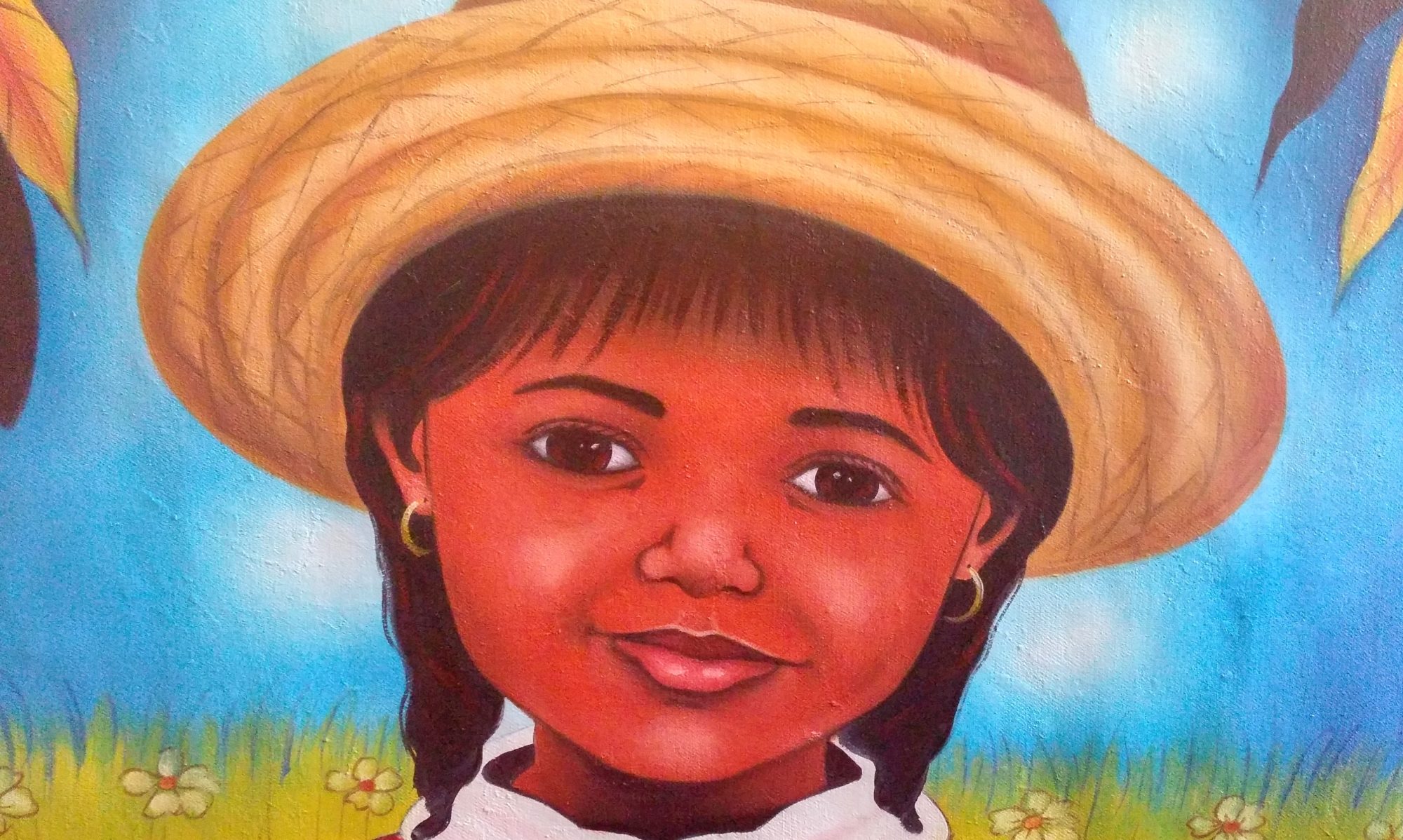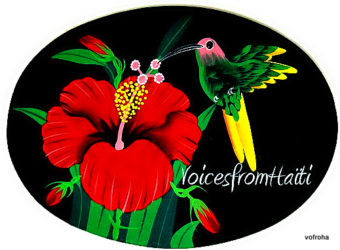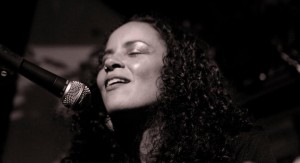Sarah Dupuy talks about her life as a daughter, an aunt, and a musician.
This lady is a true fanm vayan. She is a true artist.
The InnerView is based on a series of conversations, and was first posted on VoicesfromHaiti on January 6, 2012. Happy Reading!
VoicesfromHaiti: For those who don’t know Sarah Dupuy, how would you describe yourself?
Sarah Dupuy: I was born in New York. That makes me Haitian-American. I am someone who could be many things. I don’t really fit the stereotype of what people think of as Haitian, so I put that out there first. Even Haitians question my ancestry all the time. I think it is important to break people’s stereotypes. It is important to me that people know I am Haitian.
VoicesfromHaiti: How did you develop such an intense passion for your parents’ native country?
Sarah Dupuy: My parents never wavered in their commitment to Haiti’s politics and culture. Their island home was a huge part of our lives. From them I developed my intense passion for Haiti. I respect and appreciate our culture. Through my parents’ commitment to Haiti, I developed a sense of who I am. I consider myself a citizen of the world. I think it’s important to be a citizen of the world. There are some basic characteristics we all share, but it is important to me to put people on the right track by letting them know that I am Haitian.
VoicesfromHaiti: Your parents sound like amazing people. What would like to share about them?
Sarah Dupuy: My mother was born in Port-au-Prince. She built a school in La Plaine to support children’s education. The school is not presently in our family’s control, but it exists today. My father is from Cap Haitien. His name is Benjamin Dupuy. People know him as founder of Haiti Progres, the newspaper.
My parents did not stay together. My mother later married an African-American. They had a good life, but she found it impossible to forget about Haiti. She went back home to live. She passed away in 2005. I think of her everyday. She’s in my prayers. She is a source of strength and inspiration to me.
In Haiti when you come from the bourgeois class, it is frowned upon to be involved in the vodun religion. For this reason, my mother was considered crazy. Absolutely crazy. We all know the stigma of vodun here in the States: It is bad, it is evil, etc. My siblings did not understand that part of our mom’s life. They didn’t really criticize her, but it was difficult for them to understand.
In 2000, I did a show on Jazz and Vodou, called Congo Square: Where Jazz and Vodou Meet at New School University where I had been working in the Jazz program. My mother came. I was so happy to have an opportunity to show her how much I respect Haitian culture. I respect the choices she made. I wanted her to know that I respected her ideas. I think she understood that. That production which included Haitian-American jazz drummer Andrew Cyrille and Haitian Vodou drummer Frisner Augustin was one of the best of my life.
PART II: The Path to Music
VoicesfromHaiti: How did music come to be a part of your life?
Sarah Dupuy: We had a piano at my mom’s house. I had a short period of lessons, nothing that had any impact. My mother knew I was talented. She bragged about it to her friends. She definitely saw my gift. My father did, too. He would say: “If you’re going to do it, make sure it’s not just for money, fame etc.” They were very busy with their own lives. I had to struggle and make my own way. Some things are not meant to be handed to you. You have to go out there and make them happen. I am not bitter. Things are what they are.
I am not part of a musical family. There wasn’t anyone in my family who inspired me musically. In my mother’s home, there was plenty of soul music, from Al Green, Curtis Mayfield, Minnie Riperton to Marvin Gaye. If I found myself alone for a moment, I would play Stevie Wonder songs and hold a hairbrush as though it were a microphone. I would sing. In my father’s home there were lots of rock and soul LPs for me to listen to of artists from Santana, Jimmy Hendrix, The Beatles, James Taylor, Joan Baez to Joni Mitchell, Chaka Khan, Bob Dylan and Bob Marley. My father was surrounded with activists. For some reason, those guys carried guitars with them.
I wanted to be a grownup like my father’s activist friends so I picked up a guitar and taught myself how to play. I was 12 years old. As soon as I started to play, however, I realized that music had always been in me. It was an expression in my core looking for a source out.
As a child sitting at the feet of my father’s friends, there was not a lot for me to do. I would pick up a guitar and try to be like them. I wanted to be as good as they were. One day I found a Bob Dylan music sheet, and played that one song over and over. I still have a lot of growing to do musically. My skills don’t necessarily reflect all the ideas I have. I need to learn beyond the American folk tradition in order to express all of the musical ideas in my head. I’m working on it. When I write, I generally try to combine all of the elements of my heritage and influences: Haitian, American Soul, African music, Rock, Reggae and Jazz. I hope it all comes together well.
VoicesfromHaiti: Where do you find the inspiration to create your music?
Sarah Dupuy: I try to surround myself with people who have the skill level to teach me. Haitian composer and guitarist Monvelyno Alexis, for example, has become a mentor to me on the guitar. I also have my wonderful niece, Leyla McCalla—the cellist who has become a major inspiration to me. Growing up, Leyla—in her pigtails—would watch as I sang with groups like Papa Jube; playing along side groups like Boukan Guinen and Boukman Eksperyans. She was exposed to many interests, as a little girl, but it was the music that stuck. She committed at a young age to play the cello. She’s fortunate to have had support and praise from her parents. Leyla was consistent in taking lessons and practicing. She took music seriously. It’s funny how things work. My little niece is now my greatest inspiration. She is a true musician. She is a true artist. I feel very blessed to have her as my niece and that I get to work with her.
VoicesfromHaiti: What is your relationship like with your father now?
Sarah Dupuy: I enjoy a good relationship with my father today. We talk. We don’t see each other very often, but we talk on the phone when we can. I accept his choices in life. I appreciate him. He stayed true to himself and adhered to his own values. Not everyone agrees with his politics, but people respect him. That is one of the characteristics I appreciate most about my father. He is true to himself—for better or worse. Nobody’s perfect. We all have things about our parents that we wish we could change. That doesn’t take away from the fact that they were/are amazing people.
I thank them for instilling in me a genuine love for Haiti. I wrote a song years ago that talks about my experiences in Haiti and how I never want to forget what I see when I am there. Growing up, I recall hearing all the time that Haiti would never change. “Haiti will never change,” everyone liked to say. If we don’t stop believing that, Haiti will never change. My song is a kind of a plea to people all over the world to stop believing that.
VoicesfromHaiti: What do you think the role of the artist is in Haiti’s new journey?
Sarah Dupuy: As artists we must use our platforms to provide a message. The artist exposes the truth—however beautiful or ugly. Any artist who addresses the situation in Haiti keeps the conversation alive in our consciousness. We can sing about love. We can sing about money. But we have to keep singing about Ayiti Cherie. Where there is no awareness, there is no need for change. Where there is no awareness, there is no inspiration to take action. We must not forget.



Sarah honey,
It’s been too long since we spoke and saw each other. Nice story. Miss you sis.
I hope to see you soon to catch up girl.
Luv ya,
Judy